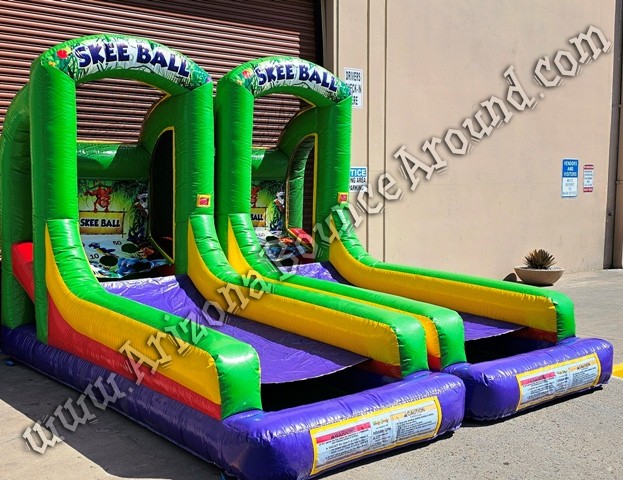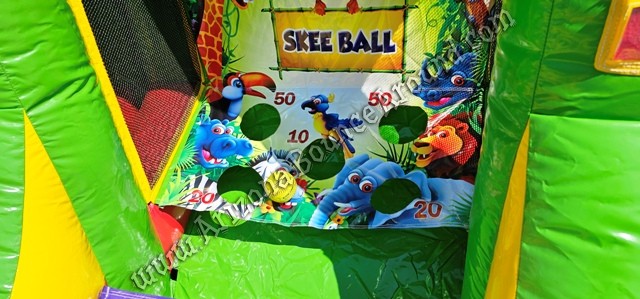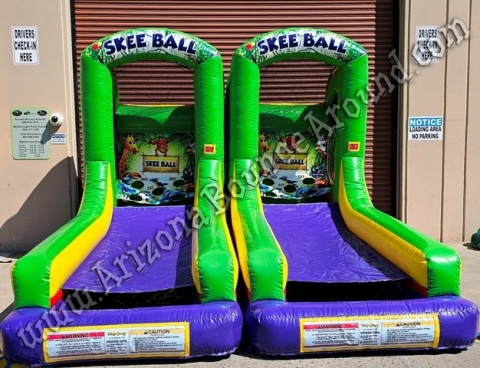Take your event to the next level with Axe Throwing!
Your Wish List
1
LED Dance Floor Rental2
Professional 850 WATT Fog Machine3
LED Park Bench Rental - Battery Operated4
Giant Slip N Slide Rental5
Fiberglass Fun Slide Rental6
19' x 19' Circus World Playland7
Mechanical Bull Rental with Western Ring8
Snowman Maze - 40' x 40'9
51' Skyscraper Water Slide10
21 x 18 Christmas Roundabout Playland11
Fiesta Playland - 19' x 19'
Double Skee Ball Game Rental - Lime Green Inflatable
Call us today 480-874-3470
Rent Skee Ball Games in Phoenix Arizona for Parties and Events
Our Dual Lane Skee Ball Game can be set up Indoors or Outdoors and Super Easy and Fun to Play for Kids of all Ages
Rent Skee Ball Games by calling 480-874-3470
Double Skee Ball Game Rental - Lime Green Inflatable
Starting At:
$249.00 /
4 Hours
($25.00 per additional hour)
Staff Not Included
*restrictions apply
Minimum space required
- 10 ' (3.04 m) wide
- 8 ' (2.43 m) tall
- 15 ' (4.57 m) long
Skee-Ball is one of the oldest arcade games in the United States, with a history dating back to the early 20th century. Here’s an overview of its development and impact:
Origin and Invention (1909-1914)
Invention by Joseph Fourestier Simpson (1909): The game was invented in 1909 by a New Jersey resident named Joseph Fourestier Simpson. He patented the game as a form of entertainment that involved rolling a ball up a ramp into target holes.
Patent Filing: Simpson filed the first patent for the game on December 8, 1908, and it was granted on June 14, 1910.
First Skee-Ball Alley: The first Skee-Ball alleys were 36 feet long, much longer than today’s standard versions.
Commercialization and Early Popularity (1914-1930s)
Production Begins (1914): Simpson didn’t market the game successfully on his own. He sold the rights to two men, John W. Harper and William Nice, who formed the Skee-Ball Alley Company in 1914 in Philadelphia, Pennsylvania.
First Public Installations: Skee-Ball alleys were set up in amusement parks and places like Philadelphia’s Riverview Park.
Rise in Popularity: The game became popular during the 1920s and 1930s, with arcades and amusement centers installing Skee-Ball machines.
Impact of the Great Depression (1930s)
Shortened Alley Length (1935): To make the game more appealing and fit in smaller spaces, the alley length was reduced from 36 feet to the standard 10 feet in 1935. This change contributed to the game’s resurgence.
National Tournaments: Skee-Ball gained national attention when tournaments began to be organized. It even became a way to win prizes in arcades.
World War II and Mid-20th Century
Popularity Decline (1940s-1950s): During World War II, materials used to produce Skee-Ball machines were scarce, and the game’s popularity declined.
Rebirth and Arcades (1950s-1970s): Following the war, the game experienced a revival in popularity in arcades across America.
Skee-Ball in the Digital Age
Ownership Changes: Over the decades, Skee-Ball went through different ownerships. One notable company, Wurlitzer, owned the rights in the 1950s, and later, Bay Tek Games acquired the rights in 2016.
Modern Adaptations: Today, Skee-Ball machines can be found in modern arcades, and there are even digital versions and home-use models.
Competitive Leagues: Skee-Ball has evolved into competitive leagues in bars and arcades, with some groups hosting official Skee-Ball tournaments and championships.
Legacy
Cultural Icon: Skee-Ball is recognized as one of the most iconic arcade games. Its simplicity, combined with the skill required to play, has helped it maintain popularity for over a century.
Skee-Ball continues to be a popular game today, embraced by both nostalgia-driven arcade enthusiasts and new generations alike.
Origin and Invention (1909-1914)
Invention by Joseph Fourestier Simpson (1909): The game was invented in 1909 by a New Jersey resident named Joseph Fourestier Simpson. He patented the game as a form of entertainment that involved rolling a ball up a ramp into target holes.
Patent Filing: Simpson filed the first patent for the game on December 8, 1908, and it was granted on June 14, 1910.
First Skee-Ball Alley: The first Skee-Ball alleys were 36 feet long, much longer than today’s standard versions.
Commercialization and Early Popularity (1914-1930s)
Production Begins (1914): Simpson didn’t market the game successfully on his own. He sold the rights to two men, John W. Harper and William Nice, who formed the Skee-Ball Alley Company in 1914 in Philadelphia, Pennsylvania.
First Public Installations: Skee-Ball alleys were set up in amusement parks and places like Philadelphia’s Riverview Park.
Rise in Popularity: The game became popular during the 1920s and 1930s, with arcades and amusement centers installing Skee-Ball machines.
Impact of the Great Depression (1930s)
Shortened Alley Length (1935): To make the game more appealing and fit in smaller spaces, the alley length was reduced from 36 feet to the standard 10 feet in 1935. This change contributed to the game’s resurgence.
National Tournaments: Skee-Ball gained national attention when tournaments began to be organized. It even became a way to win prizes in arcades.
World War II and Mid-20th Century
Popularity Decline (1940s-1950s): During World War II, materials used to produce Skee-Ball machines were scarce, and the game’s popularity declined.
Rebirth and Arcades (1950s-1970s): Following the war, the game experienced a revival in popularity in arcades across America.
Skee-Ball in the Digital Age
Ownership Changes: Over the decades, Skee-Ball went through different ownerships. One notable company, Wurlitzer, owned the rights in the 1950s, and later, Bay Tek Games acquired the rights in 2016.
Modern Adaptations: Today, Skee-Ball machines can be found in modern arcades, and there are even digital versions and home-use models.
Competitive Leagues: Skee-Ball has evolved into competitive leagues in bars and arcades, with some groups hosting official Skee-Ball tournaments and championships.
Legacy
Cultural Icon: Skee-Ball is recognized as one of the most iconic arcade games. Its simplicity, combined with the skill required to play, has helped it maintain popularity for over a century.
Skee-Ball continues to be a popular game today, embraced by both nostalgia-driven arcade enthusiasts and new generations alike.
.jpg)



.jpg)

